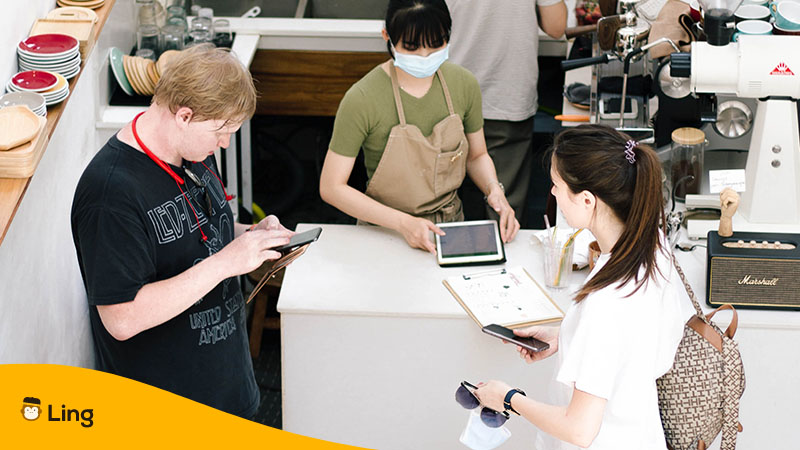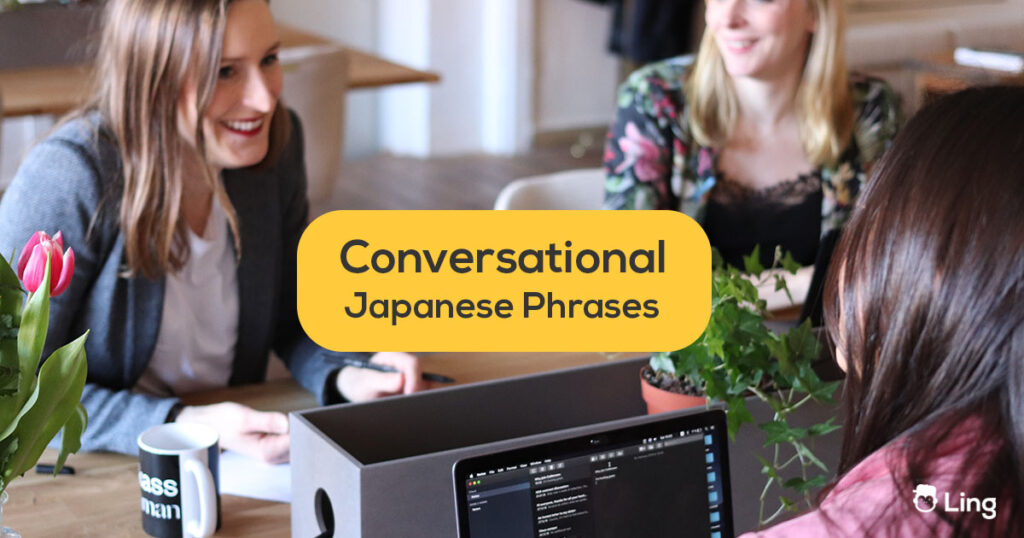Are you learning Japanese? Perhaps you have studied the Japanese language for some time and want to improve your communication skills. There is a good chance you already know a few phrases and words that will allow you to hold a simple conversation. The problem is that you may feel you lack the vocabulary to carry on a conversation with native speakers smoothly.
If that’s the case, learning some conversational Japanese phrases might be helpful so you can level up your conversations with Japanese friends. So, let’s see some terms that will help you become more confident and speak Japanese more fluently. 始めましょう!
Conversation Starters In Japanese
Starting a conversation is not easy. If you are about to talk with a person from a different culture, such as the Japanese, you may feel a little intimidated and not know how to initiate.
If you have flipped through a Japanese textbook, you may have come across a dialogue or two where they use a phrase like “the weather is nice today, right?” as a form to start a conversation. This is what it’s called conversation starters. Phrases or questions that can help you initiate a conversation.
You may be wondering why we decided to mention this now. Well, the reason is that we wanted to emphasize that on some occasions, you will be the one who will have to initiate the talk with the Japanese people.
That’s why we have included some conversation starters in the repertoire of Japanese conversational phrases so that you will have the tools to succeed at any stage of the communicative exchange.

Basic Conversational Japanese Phrases
1. いい天気ですね。(Ī tenki desu ne – Nice weather, isn’t it?)
This is one of the most common phrases used to start a conversation in Japanese. It is so popular that you might find it in many Japanese textbooks. The “weather” “is a good way to break the ice, and this topic can lead to other subjects that might carry on the conversation.
2. もちろんです。( Mochirondesu – Of course)
This phrase can be used in different ways. For example, when we want to emphasize that something has been said is correct or obvious.
For instance, if someone asks you if you will work tomorrow, unless there is a reason not to, you would respond, “もろんです” “Of course.”) You are here to learn Japanese in the best ways possible, right? もちろんです!
3. おめでとうございます。(Omedetōgozaimasu – Congratulations)
This sentence is very straightforward. おめでとうございます is used to congratulate a person for some positive event. For example, it could be a new job, a new house, a marriage, or the birth of a child; any positive outcome that requires a congratulation “お”でとうございます” is the correct phrase to use.
4. 次の駅までどのくらいかかりますか? (Tsugi no eki made dono kurai kakarimasu-ka?How long does it take to get to the next station?)
Use this phrase when you want to know how long it takes to get from one place to another. To adapt it to your current situation, substitute the words “駅” “train station) and “次” “next). This phrase could also be used as a conversation starter if you are on the train and want to talk to one of the passengers.
5. なるほど。(Naruhodo – I see)
You may have heard or seen this phrase here or there, as it is a very common response. For example, “なるほど“s used to indicate that you have understood what someone is saying to you.
6. とんでもないです。(Tondemonaidesu – Don’t mention it”)
This phrase is used as a polite response when a person shows appreciation for something you/we have done. For instance, let’s say someone thanks you for helping them complete a task. You could say “とんでもないです” is a polite way to say “you’re welcome.”
Where do you use these words you’ve learned so far? Traveling to Japan can be costly. So, if you’re a beginner or just want to keep memorizing, we recommend the Ling app.
What are you waiting for? Try out Ling by downloading it from the App Store or Play Store to start speaking Japanese in no time!
Wanna thank us? とんでもないです!
7. 私に任せてください。(Watashi ni makasete kudasai – Leave it to me)
This phrase is used when you want to tell someone to let you do something on their behalf. For example, your friend is thinking about organizing a birthday dinner; in that case, you could say “私に任せてください,” stating that you want to do it instead.
Another example would be if you are at a restaurant with your friends and they don’t know what to choose. Again, you could tell them “私任にせてください,” as a way of asking them to allow you to choose the scrumptious Japanese food for them, implying that you will choose what, in your opinion, is the most delicious.
8. 楽しんできてください。(Tanoshinde kite kudasai – Have fun!)
This phrase doesn’t have multiple meanings as others. It is only used in cases where you want to wish someone to enjoy an outing or event.

9. 私のおごりです。(Watashi no ogoridesu – It’s on me.)
This expression is used to tell someone that you want to treat them and that you will pay for their meal.
10. お大事にしてください。(Odaijini shite kudasai – Take care of yourself)
When a person is sick, and you want to tell them to rest and wish them to get well soon, you say “お大事にしてください.”
11. 気にしないでください。(Kinishinaide kudasai – Don’torry about it)
Japanese people are usually very cautious and constantly alert to whether they are causing trouble or not. Therefore, if you see that your Japanese friends are fussing over something insignificant, you can tell them, “気にしないでください.”
12. 大丈夫です。(Daijōbudesu – It’s okay)
This expression complements the previous one, and you can use it to express that everything is fine and that there is nothing to worry about.
13. それが人生です。(Sore ga jinseidesu – That’s life.)
There are moments when certain events happen, and there is nothing we can do about them, and all we can say is that this is life.
14. 好きにしてください。(Suki ni shite kudai – Do as you please.)
This expression is used to tell people that they may do or choose whatever they want.
15. もっと大きい声で話してください。(Motto ōki koe de hanashite kudasai – Please speak louder.)
When someone is whispering, and you can barely hear them, one way to ask them to speak louder is to tell them, “も”と大きい声で話してください.”
16. 手伝いましょうか。(Tetsudaimashou ka – Can I help you?)
Just as this phrase implies, it offers your help to someone you think might need it.
There you go! 16 Japanese conversational phrases that will help you express yourself more naturally and be more confident among your Japanese peers.
Learn More Japanese Japanese Phrases With Ling
Do you want to learn more phrases and increase your proficiency in the Japanese language?
Sometimes, conventional study methods to learn Japanese are not enough. That’s why Ling is a total game-changer since it offers an interactive experience that’ll leave you wanting to learn more every single day. Thanks to its wide variety of lessons and engaging activities for over 60 languages, you can learn more about your target language by using Ling for at least 15 minutes daily!
You can also enhance your knowledge and skills further by combining your Ling lessons with our updated blogs, where you can learn new grammar points, vocabulary, and everything you need to speak Japanese fluently. Download the Ling app and start your journey now!













